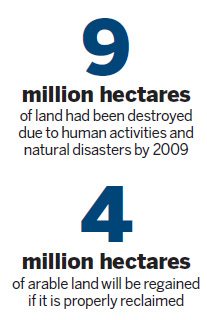Prime
Reclaimed land helps food supply
Updated: 2011-03-29 07:53
By Wang Qian (China Daily)
|
|
Huge tracts of damaged ground set to be used for agriculture
BEIJING - The country will step up its efforts to reclaim useful land and use it for agriculture in a bid to guarantee the supply of food.
According to statistics from the Ministry of Land and Resources, almost 9 million hectares of land had been destroyed due to human activities and natural disasters by 2009.
The ministry said tens of thousands of hectares of land are ruined each year by economic activity.
"If we can reclaim this land properly, more than 4 million hectares of arable land will be regained, making a significant contribution toward guaranteeing the country's bottom line of 120 million hectares of arable land," said Yan Zhiyao, director of the department of cultivated land protection under the ministry.
The central government set the minimum standard for the size of arable land needed to feed China's huge population in light of the loss of vast amounts of farmland in recent years.
In 1996, the agricultural land base was 131 million hectares but, by 2008, it had fallen to 122 million hectares.
Xu Shaoshi, minister of land and resources, said earlier that China will create an additional 1.3 million hectares of farmland through various means, including land reclamation, before 2015.
The Land Reclamation Regulation, which came into effect on March 5, calls on local governments to be clear in the basic information they supply about lost land, describing its size and location, and be responsible for reclaiming destroyed land that no individual or organization is in charge of.
The country's inventory of arable land has faced many challenges, including heavy metal pollution and over-exploitation, during the nation's fast-paced urbanization and industrialization.
The regulation emphasizes that pollutants, including heavy metals and other toxic substances, are strictly forbidden and that reclaimed land that has been polluted by them cannot be used for agriculture without intervention.
Anyone found polluting land with the toxic materials can be fined between 100,000 yuan ($14,700) and 500,000 yuan and must immediately stop.
Yan said the policy is clear but related standards and supervision measures are also urgently needed.
Wu Haiyang, director of the Land Consolidation and Rehabilitation Center within the ministry, said money is important in land reclamation efforts.
Money used to reclaim land will come from land transfer fees collected by local governments, subsidies from central government and from other channels.
The cost of reclaiming a hectare of polluted land is around 36,000 yuan.
Yan said the country plans to reclaim 290,000 hectares of land each year and expects to spend more than 10 billion yuan annually.
So far, central-government-subsidized land management and reclamation projects have accounted for more than 4 million hectares of new farming land, including arable land covering 670,000 hectares that now produces around
10 million kilograms of wheat a year, China News Agency reported earlier this month.
Through land reclamation projects, Heilongjiang province in Northeast China has earned an additional 670 million yuan from 20,000 hectares of reclaimed land, Heilongjiang Daily reported on March 18.
China Daily
Specials

Tea-ing up
More turning to Chinese tea for investment opportunities like vintage wine

A cut above
The ancient city of Luoyang is home to a treasure trove of cultural wonders.

Rise and shine
The Chinese solar energy industry is heating up following recent setbacks in the nuclear sector
